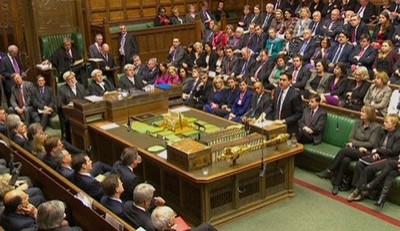Ed Miliband Sets Pay Rise Trap for David Cameron

It seems like a simple question with an obvious answer. Will the prime minister refuse to take the proposed 11% parliamentary pay rise and tell his MPs to do the same? But it is a trap.
David Cameron has, so far, avoided giving a direct answer to the question, with his spokesman simply pointing out that the rise has not yet been formally tabled and will not, in any case, be considered until after the next election.
"There is no proposal yet. There will not be until after the review in 2015 after the general election. The prime minister's view is that he wants the cost of politics to come down, not up. He does not think MPs should receive a pay rise," he said.
But the spokesman would not say directly that Cameron would follow the lead of other party leaders and refuse to take the increase and urge his own MPs to do the same.
Labour leader Ed Miliband has been far more straightforward, announcing he will not take the money and, spotting an open political goal, calling for cross-party talks on the issue to devise a way of stopping it now.
Under arrangements created after the MPs expenses scandal, the issue of pay is dealt with by the Independent Parliamentary Standards Authority (Ipsa) and is officially out of parliament's hands. And that has solved one problem - that of MPs setting their own pay scales - but created a new one of MPs being unable to veto unpopular rises.
The betting in Westminster remains that this policy will not go ahead because of the massive unpopularity among those struggling "hardworking families" all politicians claim to support. But, beyond asking MPs not to take it or Ipsa executing a U-turn, there is no formal parliamentary way of stopping it.
And for the purposes of Miliband's political trap, that is irrelevant anyway. He is determined to put Cameron on the spot and demand a clear answer and an agreement now to review the process to ensure it cannot go ahead. It is about Miliband sending a signal to voters about who really understands their concerns.
The trap is straightforward. If Cameron refuses to go along with Miliband's proposal and rule out a rise he will be portrayed as being out of touch and standing up for the wrong people.
If he agrees he will infuriate many of his own backbenchers who believe both that the job should attract higher pay to encourage more people into parliament and that, having created an independent system, it should be respected.
There is also anger amongst some Tory MPs about the prospect of being lectured on pay restraint by millionaires such as Cameron and Osborne.
Tory Sir Peter Bottomley has said he thinks Ipsa's recommendation should be accepted . "Each leader will say this is the wrong amount at the wrong time. The fact is, it was the leaders who set up the Ipsa system and people can't interfere with it," he said.
"The only way MPs could overturn this is to defy their leaders and pass a law saying Ipsa is abolished or it will be ignored. That's impractical given the public interest in setting up Ipsa in the first place."
There are those on the Labour benches, notably former foreign secretary Jack Straw, who take the same stand. But Miliband is calculating that the greatest damage will be done to the Tories.
Like his energy price freeze, the move may have some inherent difficulties - for example how exactly can parliament overrule a body deliberately created to stop parliament being able to over rule it?
But it has the huge advantage of being simple, clear and touching on voters' raw nerves over "out of touch and wealthy" Tories. Exactly the sort of campaigning Labour will be doing during the general election.
© Copyright IBTimes 2025. All rights reserved.






















